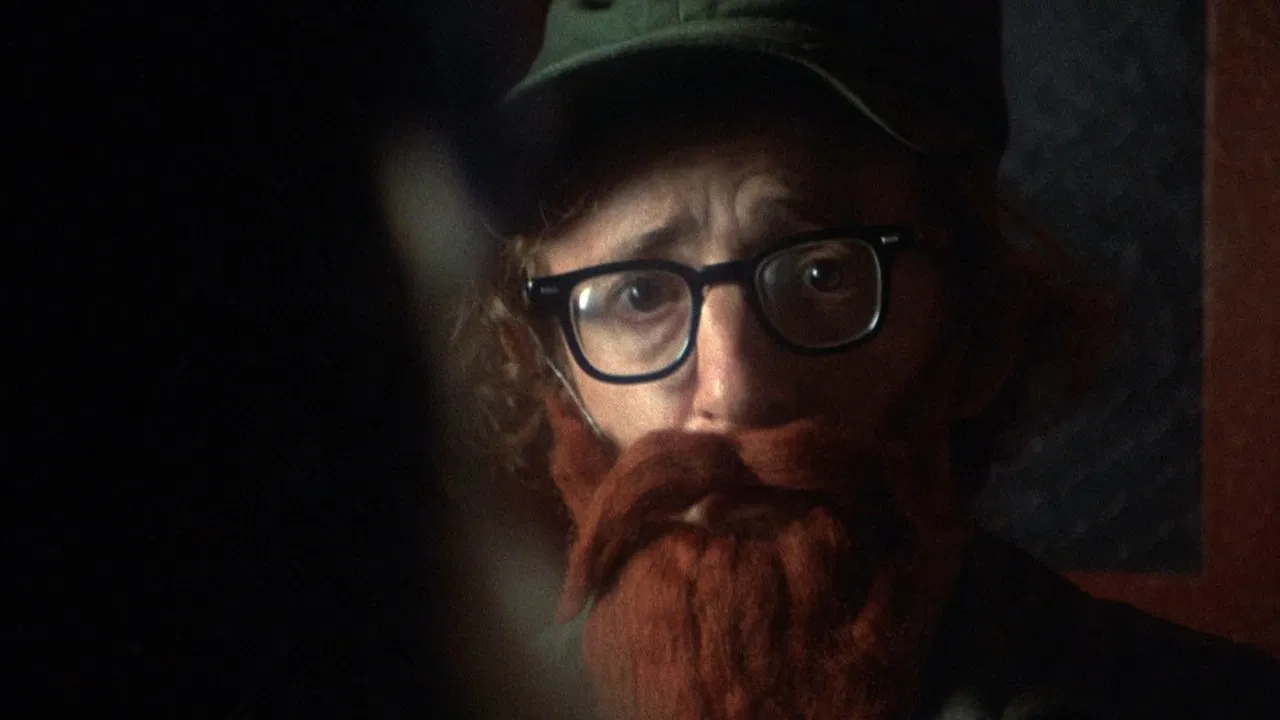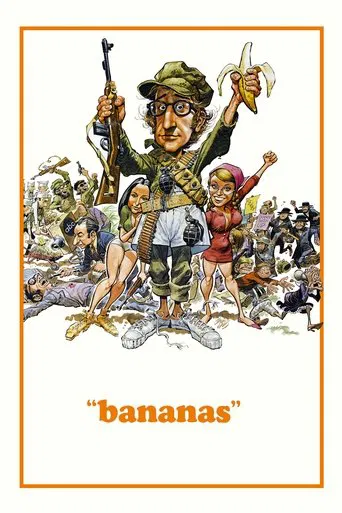



People are voting emotionally.
One of the best movies of the year! Incredible from the beginning to the end.
View MoreGreat story, amazing characters, superb action, enthralling cinematography. Yes, this is something I am glad I spent money on.
View MoreThis is a gorgeous movie made by a gorgeous spirit.
View MoreBananas is a prime example of one of Woody Allen's early 'funnies'. In other words it's a pure comedy it's as simple as that. The story is extremely broad and silly. It's about a product tester from New York who follows a political activist girl he has designs on to the Central American country of San Marcos. Soon, through a series of unbelievable events, he becomes the leader of the revolution and the nation's new dictator.This is far rawer and less refined than Allen's later work and at this stage in his career he was working with lower production values. So it might seem surprisingly basic at times and a little lacking in focus. But within all this, there are plenty of laughs and the more naive presentation is really a bit of a positive really, as it sets Bananas apart from most other Allen movies and gives it more charm. The action jumps from New York to Latin America and back again, so the story structure can be viewed as being made up of three parts. But in essence it's very episodic from start to finish being made up of a collection of comic set-pieces joined together by a loose plot. Some work very well, some not so much and others probably had more relevance back in 1971. But there is more than enough good stuff to satisfy Allen fans, with lots of slapstick, sight gags, light satire and one-liners. It also has, atypically for an Allen flick, a lively original Latin American influenced score. He would soon go on to soundtrack his movies with refined jazz and classical numbers but I personally enjoyed this early diversion from this formula. All-in-all, while he may have went on to make much better films, Bananas remains one of his most uncomplicatedly fun efforts and for this reason it's definitely recommended.
View MoreWhile, in my younger day, I loved these movies, I see now how hit and miss they could be. Woody takes his shtick to a banana republic where there has been a revolution and uses every cliché about how unstable a government can be. He ends up on trial for his life, being confronted by a black woman claiming to be J. Edgar Hoover. Miss America also shows up. There is a consummation of a marriage with commentator (big at the time) Howard Cosell. Anyway, the story is nothing but an excuse for sight gags and silliness. Allen is often at his best in vignettes and this is full of them. As time passed, he became of the world's great directors, but it took time to get the whole package. Actually, when "Annie Hall" came along. See this for a lightweight bunch of laughs and realize that all this stuff is still going on in South and Central America.
View More"Bananas" carries the same mix of tender goofiness and self-deprecating romanticism than Woody Allen's first-feature film, confirming what it had already established : the emergence of the most promising comical and comedic talent. I still prefer "Take the Money and Run" because the film was more groundbreaking as the first comedy to exploit the documentary-format, a sub-genre that would be labeled next as 'mockumentary'. However, rediscovering "Bananas" is like an insightful journey into the roots of Allen's talent.Take the title for instance; "Bananas" as a double reference to the slang word meaning 'crazy' and the banana-republics (a derogatory term defining South-American dictatorships) has the same political resonance than the Marx Brothers' "Duck Soup". "San Marcos" or "Freedonia" like "Duck Soup", a fictional setting is the arena allowing to speak the most politically incorrect statements about human nature, and its thirst for power, in the names of such big words as 'freedom' and 'democracy'. But like in "Duck Soup", politics are the vehicles for gags, not the opposite. "Bananas" has the texture of a satire, but when you realize that no drop of blood is shed, even during executions, you know the comedy is to be seen in a lighthearted way.Take now the main protagonist, with the perfect name for a neurotic loser: Fielding Mellish. Mellish is a machine-tester for a General Equipment firm. The majority of movie lovers would recognize in his first entrance the clever wink to another comical milestone: Charlie Chaplin, during the famous eating-machine scene in "Modern Times" and the mayhem caused by the Execusizer (a gym built into office desk) is even funnier because it goes unnoticed by the firm executives. Other bits of silent humor are used in "Bananas", a confrontation with two thugs in the subway (one is played by a young Sylvester Stallone), a training-montage in San Marcos' jungle. The legacy of Chaplin is so present I wondered if the grotesque sight of Allen with a false beard parodying Fidel Castro wasn't a reference to Chaplin as Hynkel all things being relative, of course.However, Allen never imitates but rather uses his writing talent to plant the seeds of his comical inspiration, that would finally bloom with his first mature comedy : "Love and Death", the film that would reveal another major influence : Ingmar Bergman. Woody Allen would reveal himself as the unlikely center of a wide cinematic universe, reconciling even the most different genres and directing styles. "Annie Hall" would become the consummate -thus the most acclaimed- Woody Allen movie. And in "Bananas", you could tell there were some glimpses of "Annie Hall" through the intellectually engaging romance with Louise Lasser. The Allenian romance would be the director's signature. To close the Woody Allen's influences parenthesis, "Bananas" might borrow many elements from Allen's predecessors, but the film is original and unique in both style and writing.It borrows naturally a lot from "Take the Money and Run", through its clever mix of realistic directing and journalistic format style. The cameos of Howard Cosell commenting on a President's assassination and the aftermath of a honeymoon, with Allen and Lasser's delivery mimicking the way exhausted athletes talk after a match, are ones of the film's highlights. And it's quite an accomplishment to use non-professional actors parodying themselves to such hilarious extremes. This material isn't revolutionary, the parody has already exploited by Mel Brooks and Monty Python, but Woody Allen elevates them to much higher summits by juggling with other forms of humor, without never distracting from the core of the story, and even when it does, it's always redeemed by a hilarious punch-line.Many viewers would look at the film as a series of disjointed sketches, each one working alone but not necessarily making a good film altogether. I would understand the criticism if it wasn't for the pivotal element of the film, which is Fielding Mellish. As the central protagonist, he's both the actor and the victim of all the unfortunate incidents that fill the film with its zany goofiness. He's never too glorious to be a hero, but never passive enough to be a victim. He's just the way he is, and Allen doesn't need many efforts to make us laugh, he's so weird and incomparable that no matter which situation you put him into, it's a laugh-out-loud guarantee. And I can't go on without mentioning one of the funniest break-up scenes ever, when Lasser tries to find out what is missing in her relationship. They enumerate the different aspects of Mellish' personality that could have turned her off, and the list is so long you wonder why he's still trying to find the one reason.Still, the romance is never independent from politics, which are the subject of more mockeries than Mellish' character himself. Most reviewers would try to analyze the film on the basis that it was meant to be a satire and I think this is the best way for disappointment. I love to take the word "Bananas" as the most standard gag of a man slipping on a banana peel, this is what the film is: a big gag. Belonging to Woody Allen's goofy period, the film is not to be taken seriously. Like in "Duck Soup", it's all about the gags. If one scene puzzles you, wait for the punch line and you're going to get its reason to be. The gags are unequally funny, but as a whole, we spend a great moment watching "Bananas". Last but not least the film is served by a catchy score and a love song signed by Marvin Hamlisch, who'd win an Oscar two years later for "The Way We Were".And this is the way Woody was, not to be taken seriously is one thing, but when it came to comedic film-making, Allen was the most serious talent emerging in the 70's, the rest is history (PS: the titular quote is from Plato)
View MoreInteriewed by Photoplay Magazine in 1980 about their then-new comedy film 'Airplane!', Jim Abrahams, Jerry and David Zucker cited Woody Allen's 1971 picture 'Bananas' as a major influence on their work. You can see why. Several gags, such as the spoof television commercial for 'Old Testament' cigarettes ( "I smoke them...HE smokes them!", quips a priest, glancing upwards ), the honeymoon consummation scene which is shot like a televised boxing match, the trial scene which involves Miss America and J.Edgar Hoover disguised as a black woman, could have fitted into any one of the gang's pictures. 'Bananas' was only Woody's second film as director, the first being the seminal spoof documentary - yes, the genre existed before 'This Is Spinal Tap' - 'Take The Money & Run'. It stars our bespectacled hero as 'Fielding Mellish', a products tester who is incredibly unlucky when it comes to girls. Nobody wants to go out with him. He meets and falls for 'Nancy' ( Louise Lasser, Allen's real-wife wife at the time ), a political activist keen to end American aid to the banana republic of San Marcos in South America. They have had a revolution there, and the country is now being run by a dictator called 'Vargas'. When Nancy breaks off the relationship, Mellish flies to San Marcos to find her, only to get caught up in the counter-revolution, ultimately becoming its new President...As was the case with 'Run', this picture contains all of Allen's usual preoccupations - sex, death, human relationships. The gags come at you like bullets from a Gatling gun, some work better than others. My favourites include Mellish trying to buy a porno magazine, dealing with thugs on a subway train ( one of whom is played by a young Sylvester Stallone ), falling down a manhole as he gets out of his car, hurting his back during training with the rebels and being forced to crouch as he joins the queue for food, President Vargas thinking he has enlisted aid from the C.I.A. when in fact it is a Jewish organisation ( suddenly the streets of San Marcos are teeming with rabbis ), and Nancy telling Mellish that 'someone is missing' from their relationship. He asks what it is, and she does not know. He replies that if she does not know what it is, how does she know its missing? Woody has never made a secret of his love for the Marx Brothers' pictures, and their influence is evident. This hails from what what we might term his 'golden age' when, along with Mel Brooks, he was the best American comedy film maker around. Three films in similar vein followed - 'Everything You Always Wanted To Know About Sex But Were Afraid To Ask' ( 1972 ), 'Sleeper' ( 1973 ), and 'Love & Death' ( 1974 ) - before Allen decided to reinvent himself with 'Annie Hall' ( 1977 ).
View More